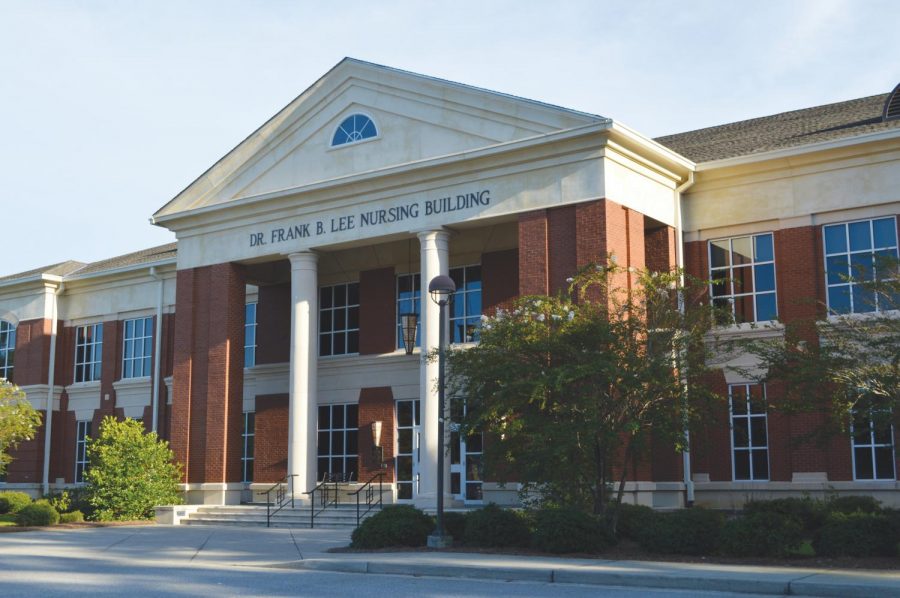FMU begins doctoral program
Doctorate of Nursing to begin January
Photo by: Kyle Graham
The Doctoral in Nursing Practice program is currently accepting applications for the first semester of classes. The program will be an online program.
FMU received approval on a Doctoral in Nursing Practice (DNP) degree from the Commission on Higher Education, giving FMU its first doctoral program.
The DNP will be a completely online program that consists of 27 hours of course work, 500 clinical hours and an evidence-based project to improve patient care, according to Dr. Ruth Wittmann-Price, the dean of the School of Health Sciences program and a professor of nursing.
Wittmann-Price said the DNP is a practice degree, meaning that students will work with research that has already been conducted to use in the best method and practice. Wittmann-Price also said the first class will accept 12 students. Each year, however, the program will accept more students.
According to Wittmann-Price, the program will begin in January of 2018 after receiving accreditation from the Southern Association of Colleges and Schools Commission on Colleges in December.
Wittmann-Price said the program is currently accepting applications.
Wittmann-Price said she expects FMU graduate nursing students to continue their education at FMU.
“The majority of our graduate students are students who have moved from FMU’s undergraduate programs to our master’s programs,” Wittmann-Price said. “So, we expect that same trend.”
Current FMU faculty will teach the program, and FMU is searching for a new professor to add to the nursing department, Wittmann-Price said.
According to Wittmann-Price, creating the curriculum and receiving approval took approximately two years. Wittmann-Price said some of the steps to create the program included finding the need for the program, getting the university to approve of the proposed program and changing the mission statement of FMU through legislative process at the state level.
The mission statement originally said FMU offered undergraduate and some graduate degrees, but after the change, the mission statement says FMU offers undergraduate programs, graduate programs and a doctoral program, according to Wittmann-Price.
Wittmann-Price, said the American Association of Nursing has said that all master’s prepared advanced practice nurses, which includes all nurse practitioners, clinical nurse specialists, midwives, nurse anesthetists and nursing administrators be educated at a doctoral level.
“These people will be working where they always work but will be better prepared to practice and to make system changes and policy changes to improve patient care,” Wittmann-Price said.
Wittman-Price said she hopes the program will improve health care in South Carolina.
According to FMU President Dr. Fred Carter, there was a need for the School of Health Sciences to continue to grow.
“I think about 15 years ago, when we began looking at our nursing programs and our other health sciences programs, we knew at that point that ultimately we would reach a level at which we would offer doctoral programs to satisfy the need of the education base were developing,” Carter said. “The bachelor of science in nursing ultimately leads to the master’s degree in nursing practice and nursing education, which leads to a doctorate in nursing practice.”
Carter said planning the nursing program came from a desire to provide a quality nursing education to students.
“I think in the very beginning it was the sense that we were going to offer quality nursing health education and medical education programs on this campus,” Carter said. “They began at the baccalaureate level and grew to the master’s level. Now they have realized that natural move up to the doctoral level.”
Carter said the role of a DNP is not to solely focus on disease treatment but instead to focus on looking at trends of sicknesses and how to prevent them.
“This type of degree does not exclusively focus on treatment,” Carter said. “It focuses on the patterns that underlie certain pathologies across a region and examines ways to systematically deal with those diseases. DNPs are certainly capable at treating individual patients, but they’ll look much more broadly at the nature of diseases.”
According to Carter, the new doctoral program will fit a niche the Pee Dee region needs.
“Diabetes, heart disease, cancer and infant mortality are diseases that virtually every community in the region faces at rates that are almost alarming,” Carter said. “The Pee Dee is a wonderful place to live, but it has one of the most abysmal sets of health indicators in the country.”
Carter said producing more graduates who will better understand the nature of diseases and understand the link between the cause and treatment of them will help the current health care situation in the Pee Dee region.
According to Carter, in the next four to five years, he anticipates FMU to add a doctorate program for the occupational and physical therapy degrees.
